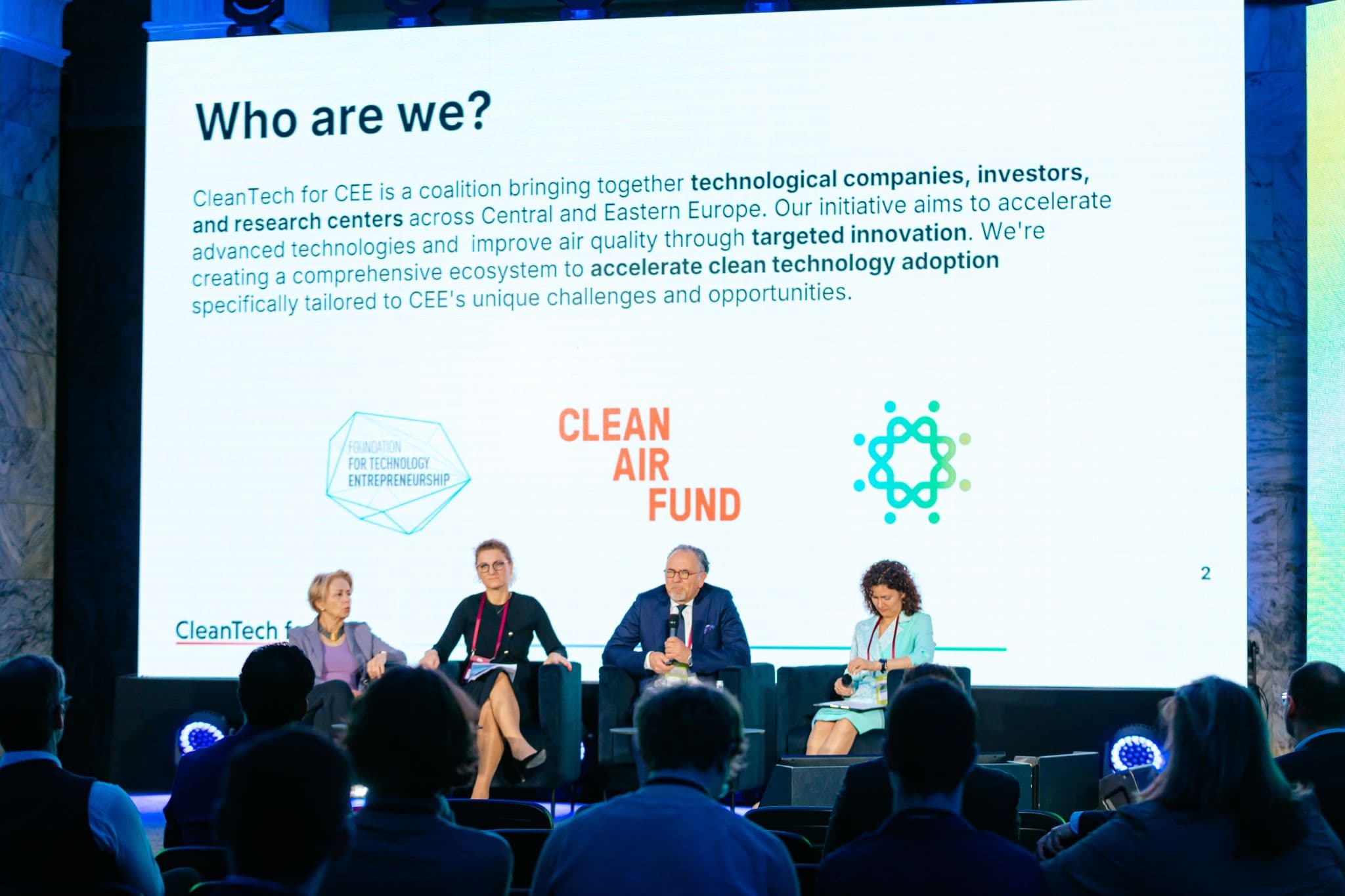How To Become a Cleantech Innovation Leader? Cleantech for CEE Debuts at MIT Global Startup Workshop

As hundreds of global innovation leaders gathered in Warsaw at MIT's Global Startup Workshop today, a new initiative emerged with an ambitious mission: transforming Central and Eastern Europe from a pure manufacturing center into the next cleantech innovation hub. Cleantech for CEE introduced itself to the international community with a research-backed report that offers a fresh perspective on the region's potential in Europe's transition.
Empowering Industry Disruptors in Central and Eastern Europe
Born out of urgent necessity, Cleantech for CEE focuses on tackling three major challenges in the region - air pollution, the need to transform industries and the need to increase energy resilience. An important puzzle piece to overcome these challenges is innovation and scaling clean technologies. By accelerating the development and implementation of clean technologies, the Cleantech for CEE initiative aims to create healthier and more prosperous communities while supporting the transition to a more sustainable economic model in the region.
Building on the momentum of Cleantech for Europe — which has united 30+ European VCs, dozens of cleantech scale-ups and start-ups with European policymakers since 2021 — this new initiative builds on the region's established industrial strengths and a great pool of talents to foster local innovation rather than relying on imported solutions.
“Clean air and economic prosperity go hand in hand. Reduced air pollution improves workers productivity and cuts down the public health system costs. Private sector engagement and innovation, alongside policymaking and public support are critical in ensuring clean air for all.” - said Jane Burston, CEO of Clean Air Fund.
The Cleantech for CEE initiative aims to help keep the door open between researchers, entrepreneurs, investors and policymakers who, together, can bring innovation and growth to the CEE market. By removing regulatory hurdles, creating new funding pathways, and forging connections with global cleantech hubs, Cleantech for CEE aims to transform the region from an exclusively manufacturing base into an innovation hub. This approach utilizes the region's industrial capabilities and technical expertise to address growing demands for clean air and decarbonization technologies—important priorities for both local communities and global investors.
Strategic Report Reveals Untapped Potential
The study unveiled today paints a surprising picture of Central and Eastern Europe's cleantech scene: impressive investment figures mask a troubling reality. While Poland leads with cleantech investments reaching 2.2% of GDP (a substantial €22 billion) and neighbors Czech Republic and Slovakia approach 2%, these headline numbers hide a crucial truth – the region primarily receives foreign technology rather than developing its own cleantech solutions.
"Despite significant foreign investment in the region, we've seen very few local companies emerge as technological leaders in these supply chains. We're advocating for policies that bridge this gap, ensuring that corporations investing in Poland will include the solutions of the local innovators into their production process" explained Bogusława Cimoszko Skowroński, Co-Head of Cleantech for CEE.
Poland has quietly become Europe's battery powerhouse, exporting more lithium-ion batteries than any other European country. The region boasts world-class engineering talent, a deep pool of AI and machine learning specialists ready to revolutionize energy management systems. Yet despite manufacturing everything from heat pumps to hydrogen technologies, the region hasn't yet developed a robust ecosystem of homegrown deeptech pioneers.
The report pulls no punches in diagnosing the problem: "Our findings indicate that the biggest obstacle to indigenous innovation isn't a lack of technical talent or manufacturing capability, but rather fragmented systems and lack of coordination in between that prevent knowledge transfer between academia, industry, and entrepreneurs," noted Mirosław Janik, Director of Cleantech for CEE. "By redesigning these connections and facilitating collaboration, we can try to dramatically accelerate the pace of cleantech development."
To break this pattern, the report outlines a strategy that goes beyond conventional approaches. Rather than simply increasing R&D budgets, it suggests exploring reforms to how innovation happens in the region.
First, the report urges policymakers to transform relationships with investors through concrete policy measures. Rather than competing primarily on labor costs and tax incentives, governments should implement targeted innovation requirements in investment agreements. These could include mandatory R&D spending thresholds, joint venture provisions with local technology firms, and preferential treatment for investors who engage local suppliers in product development—not just production, higher subventions for Customers buying local solutions This strategy moves beyond passive investment attraction toward active ecosystem building, where foreign capital becomes a catalyst for domestic technological advancement rather than merely extracting value from affordable manufacturing.
Second, the report highlights the value of connecting entrepreneurs directly with scientists and corporations facing specific challenges. This approach focuses on facilitating meaningful interactions between these key stakeholders. By bringing together problem-solvers and those with real-world challenges, the aim is to spark innovative ideas that can be practically implemented. These organic partnerships are expected to generate implementable solutions in the short term, with the potential to develop into technology companies as a next step. This strategy emphasizes flexible collaboration, allowing innovation to emerge naturally from the intersection of business needs and scientific expertise.
Building Tomorrow's Industrial Champions
The Cleantech for CEE initiative represents a collaborative effort by a founding coalition that unites investors, technology companies, and universities committed to establishing Central & Eastern Europe as a cleantech hub.
"We aim to take a step-by-step approach, testing our proposed method and refining it as needed," concluded Magdalena Jabłońska, Co-Head of Cleantech for CEE. "By continuously adapting, we strive to create a more supportive environment for deeptech startups, driving sustainable innovation and long-term economic growth in Central and Eastern Europe."
In the coming months, Cleantech for CEE will form its coalition membership and engage with policymakers to discuss ways forward.
The full report, titled "On a mission for Clean Air and Clean Energy in Central and Eastern Europe" is available for download at website